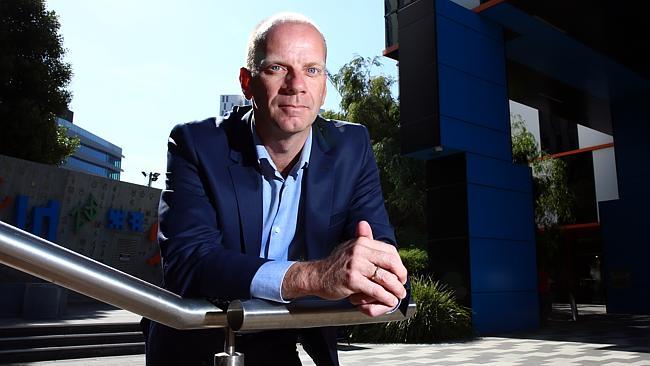Mental health a big issue in the workplace
PROPER strategies and resources lead to better, more welcoming workplaces.

It could be the person sitting in the cubicle next to you, your manager or your chief executive.
The incidence of mental illness in the workplace is rising, and businesses are being encouraged to implement strategies to deal with growing needs.
Manpower subsidiary Safesearch has released its annual survey of 1200 people, which identifies mental health and wellbeing as the top issue facing organisations.
Of those surveyed, 85 per cent found health and wellbeing strategies of high or significant importance within their organisations, but only half have dedicated resources to handle them.
Concerns include psychological illness, mental health, fitness, drug and alcohol use, managing depression and stress.
Software development company Readify, which has been included in BRW’s top 50 places to work four times, is aware of mental health issues in its workforce and is taking steps to ensure strategies are in place and people can seek help.
Managing director Graeme Strange has more than 180 employees . He has found one way to help people with mental health issues is to ensure they can work under flexible arrangements.
“If you’re more effective working from home or a cafe, work where you’re most effective,” Strange says.
“Very early on we were giving people the tools to be more effective, and sometimes the workplace is not the most effective.”
That also includes encouraging people to leave early and spend time with their children or families after school, increasing wellbeing, and allowing people to make up the time later.
Readify encourages staff to turn off devices after hours, ensuring they can de-stress and relax at night, and provides training to identify mental health issues, rather than solving them.
“It’s not for us to sit down with staff and say, ‘Let’s talk about your mental health issues’ — we’re not experienced,” he says.
“We’d say, ‘Let me help you.’ It’s about encouraging them to get professional help.”
The World Health Organisation defines good mental health as being free of any particular disorders, having a state of wellbeing where people manage daily stress, work productively and participate actively in their community.
About 2 per cent of the population has a recurring mental illness, including mood disorders, bipolar disorder or depression, anxiety, psychosis and post-traumatic stress.
Up to 30 per cent of staff in any workplace are anticipated to have a mental health disorder at any time.
Mental health plans have been shown to improve staff retention, increase wellbeing and productivity, and cut absenteeism.
While there are workplace legal obligations and occupational health and safety requirements, employers have a duty of care to ensure their site is safe and healthy.
Employees are not obliged to report mental health problems, but disclosing their issues means they often create a more inclusive environment free of stigma and allowing additional support.
The Mental Health Commission in Western Australia released a 10-year plan last year to support improved workplace strategies.
Recommendations include championing a culture of respect for diversity; dispelling myths through newsletters, posters and forums; treating mental health like other illnesses; making sure staff are aware of employee assistance programs; promoting flexible hours; encouraging staff to maintain a balance between physical, mental and social wellbeing; monitoring performance feedback; and acting on discrimination and bullying.
The strategy also advocates training in mental health awareness, stress management, interpersonal skills and negotiation.
Since launching its Heads Up program in May, Beyondblue has provided practical information to workplaces and individuals about taking steps to deal with and demystify mental illness.
Nick Arvanitis, who heads research and development in Beyondblue’s workplace programs, says it aims to help people recognise the signs and symptoms. “You might think that Joe is underperforming because he’s lazy, but it might also be that he has a mental illness,” Arvanitis says. “It’s about making sure people are aware of support systems.
It could be an EAP, or Heads Up, or Lifeline if they’re in a difficult position.”
More than 3800 organisations have registered with the Heads Up website, which includes videos on how to disclose mental illness and how to identify colleagues who may be suffering. Beyondblue can also provide guest speakers on mental health and staff training.
Waking up from a dark place
ON the outside, Mark Leopold is the picture of perfection. He has a beautiful family with two daughters, a successful career and had a happy upbringing.
But Leopold, who is the strategy director at software development firm Readify, had been battling depression and anxiety for most of his life — behind a facade.
“I was having mood swings, I’ve got lots of friends and I might recede into myself and not want to see anyone,” Leopold says.
“For me it was also the sleeplessness, and we all lose sleep but this was for weeks and months. That again is a pretty dark spiral and you talk yourself into some pretty dark places.”
Leopold was diagnosed with clinical depression but, instead of taking medication, he chose to help himself through diet, exercise and seeing a psychologist.
“I started to exercise and really started to run and I started to sleep,” he says. “I’d wake up with a clearer mind and because I was in a better space I started to speak about life with my wife and friends.”
Leopold felt he had something to offer to other executives who also might be struggling with depression but not talking about it, and offered to volunteer with Beyondblue.
He takes one day off most weeks, where he speaks to businesses about battling depression in the workplace.
“In the corporate world we often think that everything we do is our life,” he says. “We’re expected to be the perfect citizen, the perfect worker, and sometimes we need to let the mask down.”


